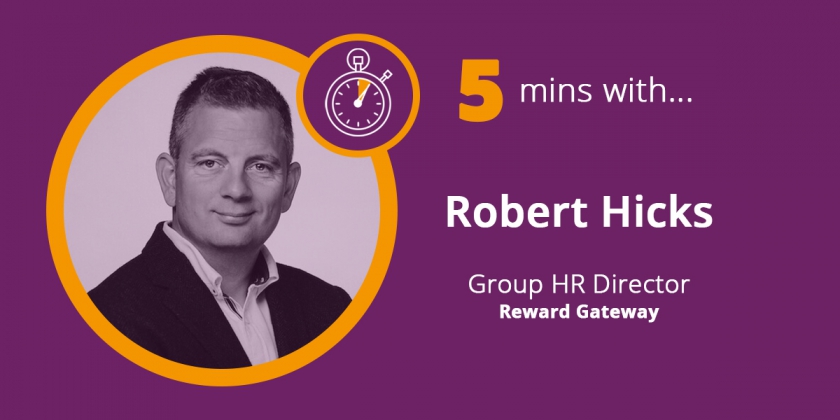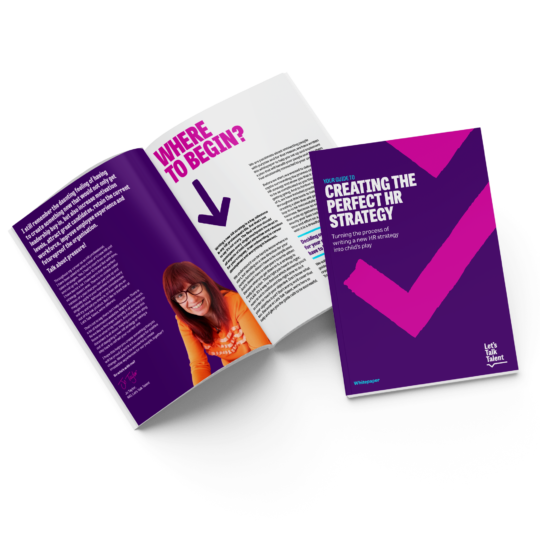This month we speak to Robert Hicks, Group HR Director at Reward Gateway. We discuss Robert’s career to date, his role at Reward Gateway and his HR philosophy, all in 5 minutes…
What is your HR background?
I am a generalist, having spent the last 23 years working in a variety of businesses and covering a wide range of geographies and sectors. I began my career as an HR Consultant at the British Council. This huge global business was an amazing place to learn about HR. I then moved into the private sector, running HR for Workspace Group Plc, and then Exponential-e. I went on to set up my own HR consultancy, working first at Cognizant and then at Reward Gateway, where in 2016 I ended up making the switch back to working in-house, and have been here ever since.
What does your role as HR Director at Reward Gateway entail?
I am the lucky custodian of the People & Experience teams at RG. This means I’m responsible for all our people worldwide across these numerous teams and departments, including Employee Engagement, Learning & Development, Reward & Benefits, Diversity & Inclusion, Office Experience , People Ops, Internal Communications and Recruitment. Basically anything and everything people related.
What role does reward play in building your employee experience?
Reward is an integral part of the experience that an employee gets from their employer.
Reward is often seen in terms of base salary, but in my view it is much wider than this. For me, any discussion of reward has to include the whole package – Employee Value Proposition (EVP) in modern language – with recognition being central to the modern reward approach. Doing the right things with pay is around balancing out all the different parts of the package to make sure everyone feels respected, recognised, and rewarded.
If these things are done well then the employee experience will be good at the base level.
You have a global remit at Reward Gateway, how do you tailor your approach for different countries or regions?
Think global, act local is our motto. Always have in mind that being consistent is the right and proper thing to do, but also that each country will have their own needs and you will often have to adjust what you do to reflect this. I have learned a lot about what is important to people in different countries. Just like millennials are not one group with one view or one consistent need, people who share the same nationality are still unique in their own ways, with their own individual challenges, goals and points of view.
I try and have the biggest picture I can, with a mix of local and hyper-local plans, supporting each country in a way which is consistent with a global perspective whilst remaining sensitive to local needs. It is challenging to do well, but very rewarding when it works.
What’s your HR philosophy?
It is not just about the people, it is also about the communication.
Everything we do in HR is ultimately about how we communicate. This is the single biggest factor which determines our success.
A difficult decision communicated well will be received in a positive way, and a good decision communicated badly will have the opposite effect.
If you could change one thing in HR now what would it be?
Wow, that is big. If I could change one thing it would be to create a way to reduce the conflict that occurs when a business and an employee are not getting on. I’ve helped lots of friends navigate these choppy waters, and you know what the end result is, but the law does not help you as much as I think it could.
What’s the biggest difference you’ve made to the culture?
One of my inner goals, and one of the main things I focus on in HR is getting people to do the right thing, whether that’s managers or employees. This means helping everyone buy into our values and keeping our mission at the centre of everything we do.
I think from an HR perspective I have brought a calmness to the team and to the business, but with a focus on getting things done. As an HR person in a business that sells to HR I am very aware that lots of colleagues really get what we do, and know what good looks like, which actually really helps me.
How do you measure the success of your strategy?
I think this is where you need a balanced scorecard. I would say the growth and development of the team, the success of the business, the feedback I get from colleagues on what we do, the benchmarking we do, and the external recognition we get for our achievements.
Constantly assess, amend and iterate to ensure that what you do is not only different but also successful.
When you look at your career to date what has been your biggest achievement?
I think my biggest achievement is the success of the people who have worked for me. These folks are at the top of their professions, with D level titles in their own fields in some cases, and pretty much every one of them is doing something great where they are.
I always assess myself against the following statement:
“The success of a leader should be measured by the growth and development of their team, past and present.”

